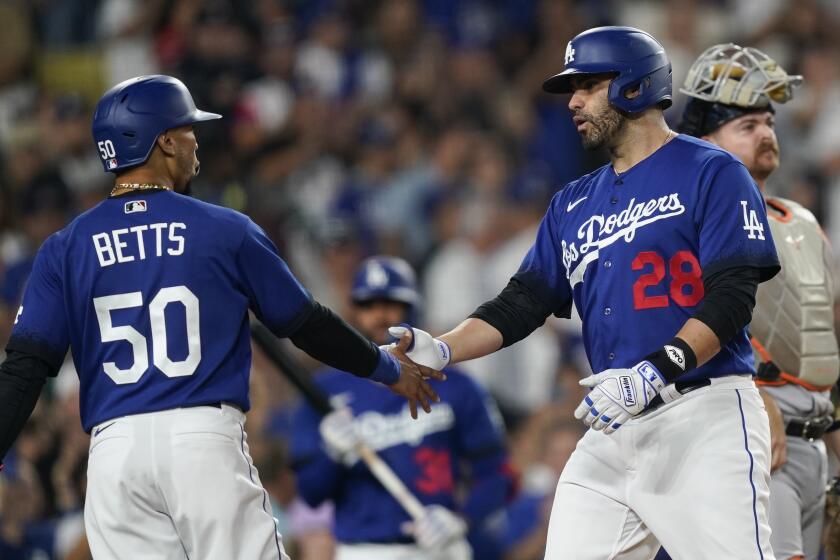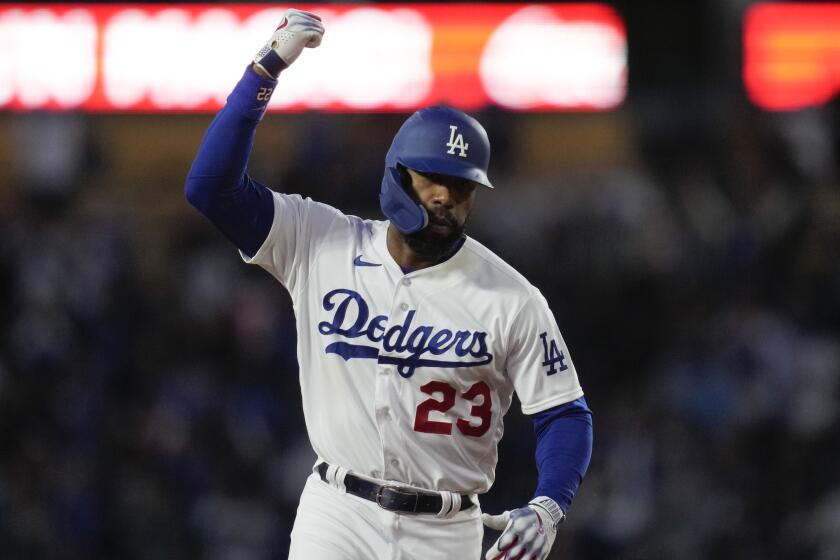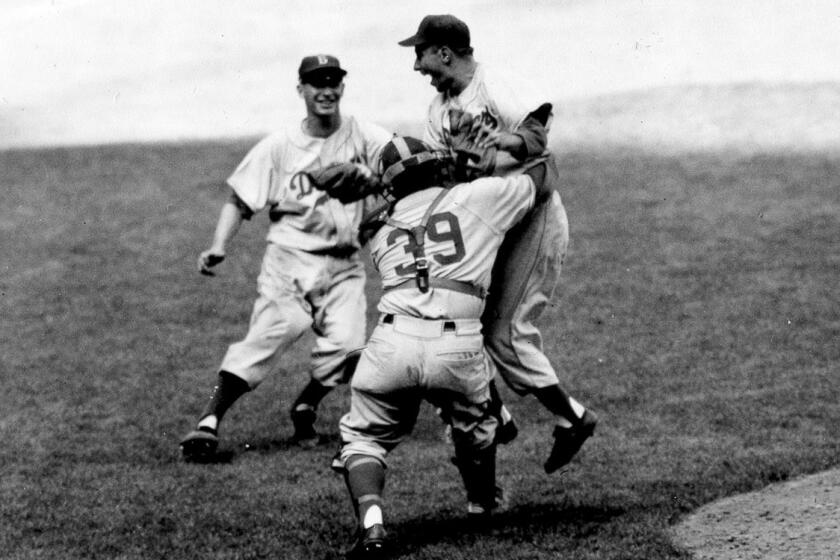‘He’s such a glue.’ Jason Heyward leaves impact on Dodgers with platoon-role production
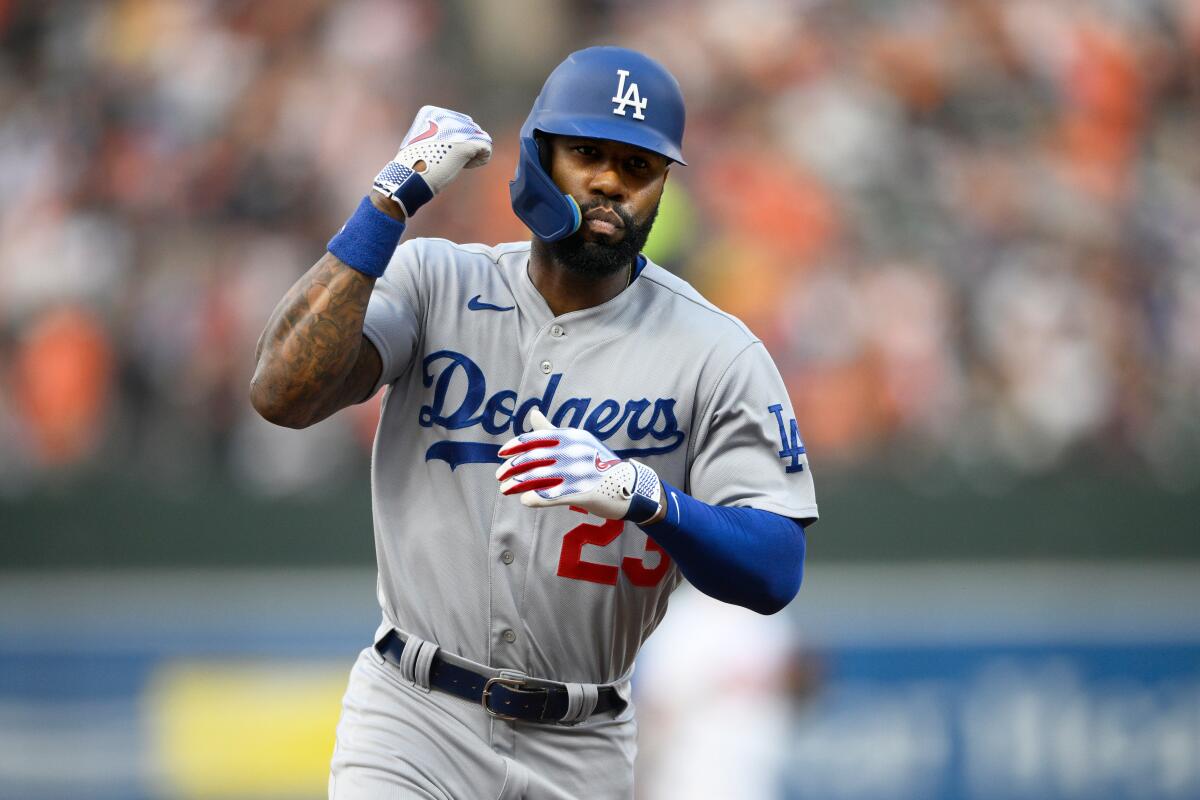
It was a memorable swing, followed by an even more meaningful understanding.
On July 18, in the second inning of a scoreless game against the Baltimore Orioles, Jason Heyward squared up a low fastball from right-handed starter Tyler Wells.
He launched a three-run homer a projected 414 feet, his longest drive in almost two calendar years.
The Dodgers have seven games remaining before beginning the playoffs on Oct. 7. They start with a less-than-ideal doubleheader Tuesday in Colorado.
And, in one of many highlight moments during his resurgent season with the first-place Dodgers, he gave the team an early cushion in an eventual 10-3 win at Camden Yards.
“He’s one of the key pieces,” Dodgers broadcaster Joe Davis said on the SportsNet LA broadcast as Heyward returned to the dugout. “Not just with what he’s done production-wise, but what he’s meant for the guys around him.”
Indeed, if the home run typified the former point, what came next exemplified the latter.
Heyward’s blast sparked a five-run inning that chased Wells from the game. By the time Heyward, a left-handed slugger, came back to the plate an inning later, the Orioles had summoned a left-handed reliever, Cole Irvin, to the mound.
It didn’t matter that it was only the third inning. Or that Heyward’s only at-bat had been a scorching blast to straightaway center.
On a platoon-minded 2023 Dodgers team — one determined to match up right-handed batters against left-handed pitchers, and vice versa, as often as possible — Heyward’s day was done.
His final stats: One plate appearance. One home run. One early exit.
His most important contribution, however: Having zero postgame complaints.
“I signed up to play winning baseball and have a chance to do it late into October,” Heyward said when asked afterward about the early platoon switch, unflinchingly endorsing the Dodgers’ game plan even on a day it left him on the short end of the stick.
“Whatever role that means is something I’m going to be ready for,” Heyward added. “It’s just nice trying to win every game, every single day — no matter what comes our way.”
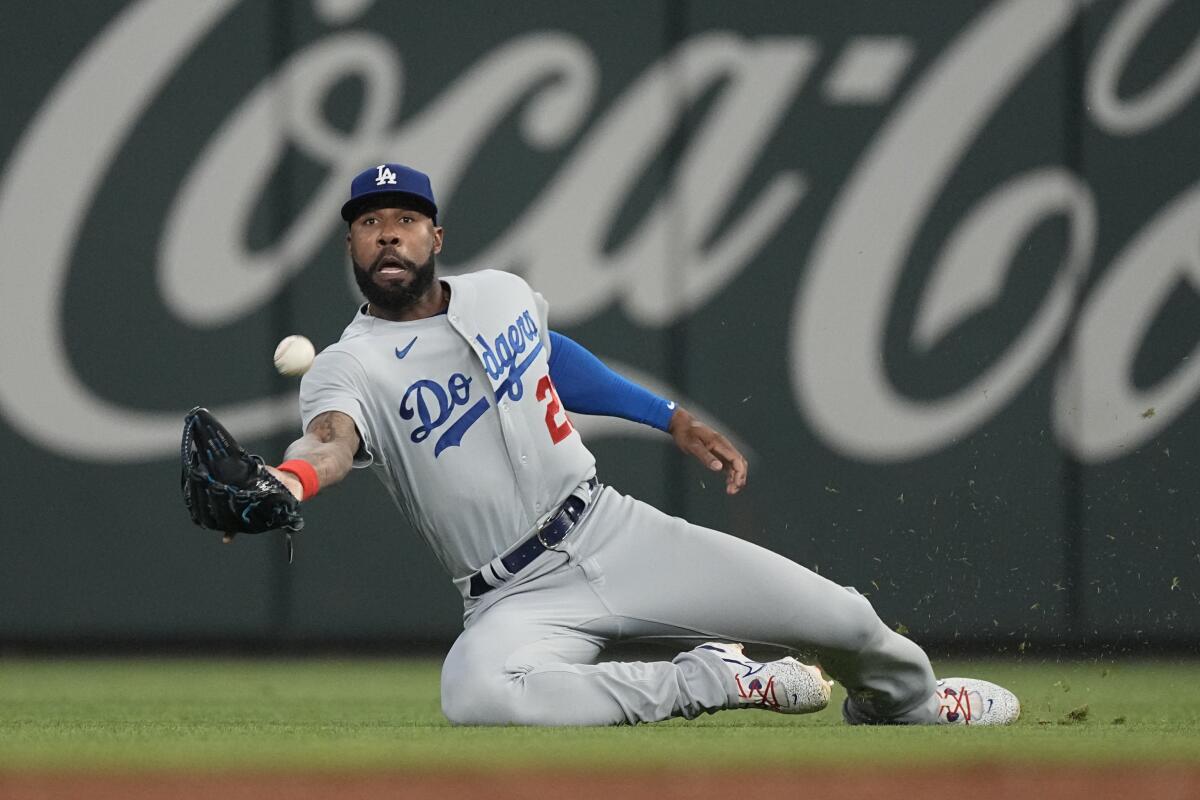
Ask around about what makes Heyward, the 34-year-old veteran who went from a minor league signing this offseason to an integral part of the Dodgers’ division-winning team, and it’s moments like this that get referenced the most.
Not his 15 home runs (his most since 2019), his .268 batting average (his best since 2018) or his .825 on-base-plus-slugging percentage (his best in a full season since he was an All-Star rookie in 2010).
But that, on a team dependent upon role players producing in part-time roles, Heyward has been perhaps the most impactful example — reviving his career on the field, while further entrenching his place as one of the majors’ best “clubhouse guys” off of it.
“You see him every day coming in working, helping the younger guys out, his whole routine, how professional he is,” catcher Will Smith said. “That rubs off on guys.”
“He’s a really selfless person out there,” added pitcher Bobby Miller, one of several rookies who made a point of thanking Heyward with a handshake and picture following the team’s division clinch this month. “I feel like he truly brings this team together.”
“He’s such a glue in there, such a great guy, such a great teammate,” third baseman Max Muncy said in an interview with Foul Territory last week. “He really just cements the clubhouse.”
For Heyward, it’s been a rewarding experience.
A year ago, he’d effectively been exiled from the Chicago Cubs, who announced they would release the then-underperforming and injury-plagued outfielder in the offseason and eat the $22 million they owed him in 2023.
Heyward went into the winter confident in his abilities — “I know I can still play,” he told himself — but unsure if any other team would give him an opportunity to show it, especially one with championship aspirations.
Thus, when the Dodgers — who were encouraged by Heyward’s longtime friend, first baseman Freddie Freeman, to give him a shot — called with an opportunity to be part of their outfield mix, Heyward embraced it with open arms.
“This is what I definitely hoped would happen,” Heyward said, reflecting on a regular season that has been among the best of his career. “I knew I had winning baseball in me. I definitely knew that.”
That didn’t mean the 14-year veteran had nothing to learn.
Once an everyday player in Atlanta and St. Louis, Heyward acknowledged that his transition into more of a platoon player during his latter seasons with the Cubs was a “curveball.”
He understood the rationale — Heyward has batted 38 points higher against right-handers than left-handers in his career — but initially struggled to adapt his daily routine and mental approach.
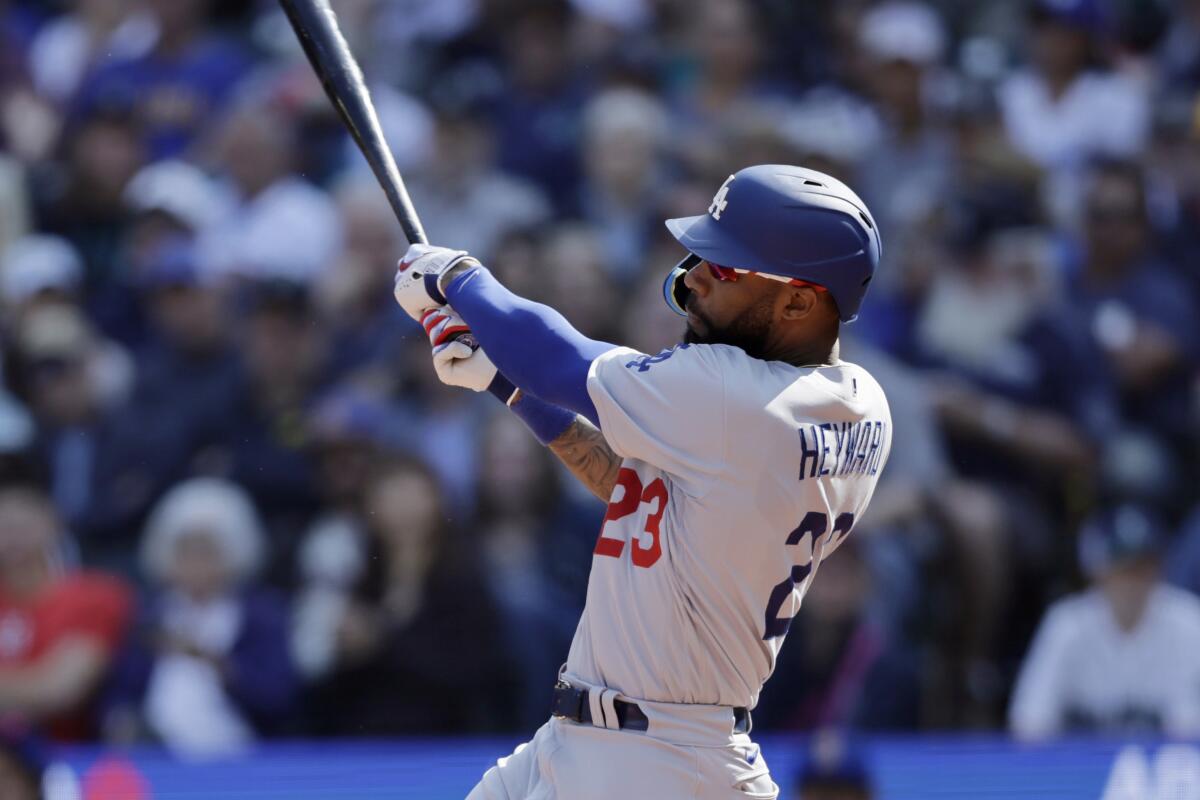
“It’s always important to be focused on the ‘constant,’ ” Heyward explained. “But you also have to shut off the care factor in certain areas. … It’s tough to tell yourself not to care about certain things.”
Even tougher, still, for someone who saw himself as a clubhouse leader.
“That was a brand-new transition to me,” he said. “It was something I had to learn to do at this level.”
With the Dodgers, however, Heyward knew there was no other choice. The club built its 2023 roster with platoons in mind. The outfield was the biggest area of focus, with such lefties as Heyward, David Peralta and James Outman alternating with right-handers Chris Taylor, Trayce Thompson and, following his arrival at the trade deadline, Kiké Hernández.
In Heyward, the Dodgers sought not only production against right-handed pitching, but also a veteran presence who could engender buy-in from the rest of the roster.
“There’s no player that doesn’t want to be the guy,” manager Dave Roberts said. “But there’s also a part of being a good teammate and realizing that somebody might be a little better option at that moment, and [you need to] root on your teammate.”
And though Heyward surpassed expectations at the plate — riding a new swing he worked on with Dodger coaches in the offseason to the fourth-best OPS on the team this year — he never pushed back against his part-time role.
Not after starting on the bench in all 48 games the team has played against left-handed starters.
Not after being pinch-hit for in 40 of the 93 games he has started.
Not even on the day he hit his three-run homer in Baltimore, then failed to get another at-bat.
“I don’t think people understand how hard that is,” Freeman said of that game against the Orioles. “[He could have been thinking], ‘I’m gonna get three or four at-bats. I’m gonna have an amazing day.’ And instead, he was OK with it.”
Added Roberts: “When you’ve got veteran guys who do that, everyone has to follow.”
Dodgers outfielder Jason Heyward committed to play baseball at UCLA, where his great uncle was a star. Then he was drafted by the Atlanta Braves.
Of all the Dodgers’ pending free agents this coming offseason, Heyward seems like one of the best fits for a return in 2024.
He could provide depth to an outfield that should again need it next year. He would offer continuity to a clubhouse that has endured extensive turnover in recent winters. Most of all, he expressed interest in staying in L.A., saying this week his primary motivation is to remain with a contender for the rest of his career.
“I would love to be asked to come back,” he said. “If they feel like I’m valuable to be back here, that would be an honor.”
For now, though, his focus is in the present. His personal mark was left long ago on this year’s team. Now, he’s eager to see how far they can go in October.
“That’s what’s really cool [about this team],” he said. “It sounds simple, but to me, winning and playing to win has made everything that much more simple. It’s like, ‘Hey, what are we focused on today? Winning.’ And a lot of good things come from that.”
More to Read
Are you a true-blue fan?
Get our Dodgers Dugout newsletter for insights, news and much more.
You may occasionally receive promotional content from the Los Angeles Times.

